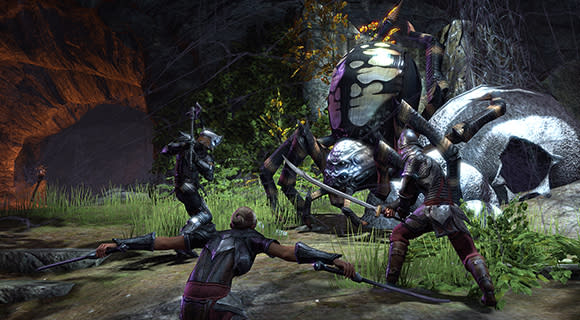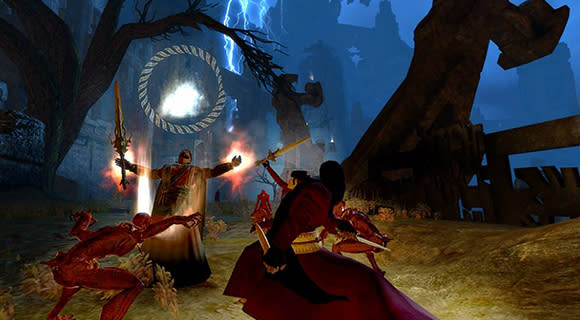The Soapbox: Seriously, we have enough fantasy MMOs
Let's play a game. I'm thinking of an MMO that features magic, monsters, humans, and a vast fantasy world full of steamy swamps, grassy plains, and deep, dark dungeons -- can you tell me which MMO it is? If you answered RIFT, you're right. You're also right if you answered TERA. Or World of Warcraft. Or Guild Wars 2. Or Neverwinter. Or... you get the idea.
We're people who play MMOs. Our hard drives are practically bulging with games featuring wizards and warriors. We've plunged our swords into millions of orcs and gnolls. We've looted more imaginary copper pieces than anyone could possible imagine. We've even slain so many dragons that you have to wonder why dragons even bother showing up anymore.
It's not the gameplay but the setting that can make the whole exercise so soul-crushingly boring.
The well-trodden world
One of the most engaging elements of playing any game is exploration. Even in on-rails FPS titles like Call of Duty, there are nooks and crannies to investigate that deepen the experience and reward the player. Open-world MMOs, which invite us to inhabit a vast universe full of mysteries, are supposed to spark our inner curiosity and send us careening off into the night searching for surprises. They're supposed to provide us with an entirely new world to chart.

Unfortunately, we've already charted these worlds, dozens of times. Whether we are adventuring in Telara, Tyria, or Tamriel (thanks, Eliot), we've already seen most of the sights worth seeing. Think back on your MMO gaming past; how many caves have you investigated (with obligatory cave spiders)? How many bright starting zones with lush trees have you visited (with obligatory bunnies)? How many pits of lava have you avoided? How many centaurs have you killed? This "been there, done that" feeling deadens our sense of wonder and makes it harder for us to immerse ourselves in new experiences.
If you were to take 10 of the most popular fantasy MMOs and put them up on screens next to one another, could anyone who isn't actively playing one of those games actually tell them apart? Could you?
Tropes upon tropes
There's a reason games like RIFT, TERA, and Aion go free-to-play: Many of the players who flock to those games looking for new experiences at some point have an epiphany and think, "Wait. I've done all this before." Sure, we can point to crummy mechanics, a missing endgame, gimmicky features, or whatever else we want, but at the end of the day, it's the world that keeps players engaged. Players will suffer through incredible, horrible conditions if they're in love with the world. Just ask anyone who played City of Heroes or Star Wars Galaxies.

If an MMO developer is truly bold and innovative, that developer shouldn't be afraid to build a brand-new world that falls entirely outside of the fantasy tropes that have come to symbolize the genre. Instead, MMO developers seem to be stuck in fantasy land, building the same tired universes that we've visited all-too-many times, and hoping that a slight tweak on mechanics, aesthetics, or lore will make up the difference. In almost every case, these minor improvements are not enough.
It's important to note that players who abandon specific MMOs don't necessarily abandon the genre. The players who left RIFT or Aion after launch probably didn't burn their PCs and buy copies of Halo. Instead, they either moved on to new, more exciting MMO experiences or returned to the fantasy worlds they were already inhabiting when those games were released. The fantasy niche is stuck in a cycle where players hop from one to game to the next, always searching for their next High Elf fix.
Missed opportunities
While fantasy-based games slug it out over the same few million players, studios willing to take chances and step outside the norm have an opportunity to claim vast rewards. Games like EVE Online, The Secret World, Champions Online, World of Tanks, Fallen Earth, and DC Universe Online may not be enormous, high-profile games à la World of Warcraft, but they do command loyal followings that have helped to keep them afloat. If you were a developer, would you rather have 500,000 steadfast supporters or a million fidgety gamehoppers all waiting for the next big thing?

These games aren't perfect, of course. And we've seen plenty of non-fantasy MMOs launch and collapse or be forced into free-to-play (this is also caused by the subscription model being deader than a door nail). No game is ever guaranteed success. But it's hard to imagine why any creative person would look at the current crop of MMOs and think to himself, "What this genre needs is more fireballs and robes." It is mind blowing that publishers continue to churn out carbon copy fantasy garbage only to be stunned when no one wants to play it.
Almost any game will have a few players who enjoy it. The hate mail I still get for my hands-on with (what was at the time called) The War Z is a testament to that. But an MMO's true success is defined not by how many people play it but by how well it can create a dedicated community that plays for years on end. Games offering unique settings have a better chance of inspiring loyalty in their players and surviving for the long haul than games relying on minor variations on existing content.
Looking forward
Even now, with around a half-dozen fantasy-based MMOs dying on the vine, studios insist on bringing out more. Nearly every press release or news tip Massively receives could be completely game neutral. They're all about warriors or goblins or foundries or dragons or dungeons or any other incredibly predictable and over-used cliché the current crop of fantasy titles has to offer. There are some promising concepts on the horizon to be sure, but we're going to have to wade through a whole lot of chain mail to get there.

As far as high profile games go, The Elder Scrolls Online is one of the most anticipated games of next year, as is EverQuest Next. Both are set in fantasy worlds. Both will offer the same template lands to explore. The two games couldn't be more different in terms of mechanics, lore, and design, but at their core they are both games based on the same might and magic as RuneScape, Ultima, and Lineage.
With over 20 years of progress in this niche, you'd think we would have come a little further.

Everyone has opinions, and The Soapbox is how we indulge ours. Join the Massively writers every Tuesday as we take turns atop our very own soapbox to deliver unfettered editorials a bit outside our normal purviews and not necessarily shared across the staff. Think we're spot on -- or out of our minds? Let us know in the comments!


